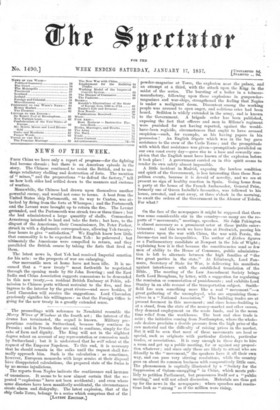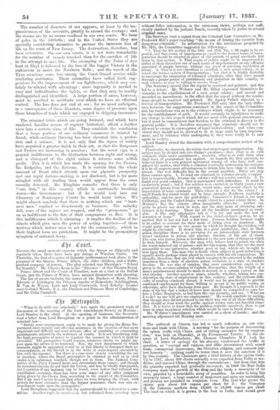NEWS OF THE WEEK.
-nom China we have only a report of progress—for the fighting had become chronic ; but there is an American episode in the story. The Chinese continued to resist the British, and to undergo retaliatory shelling and destruction of forts. The mention of " mines," and the preparations "to defend the factory," tell us how both sides had settled down to the manners and customs of warfare.
Meanwhile, the Chinese had drawn upon themselves another powerful enemy, and would not come to terms. A boat from the United States ship Portsmouth, on its way to Canton, was attacked by firing from the forts at Whampoa ; and the Portsmouth and the Levant were brought up to return the fire. The Levant grounded, and the Portsmouth was struck two or three times ; but she had administered a large quantity of shells. Commodore Armstrong intended to land and take the forts ; but here, to the disgust Of the Americans, their Commissioner, Dr. Peter Parker, struck in with a diplomatic correspondence, allowing Yeh twentyfour hours to give "satisfaction." We English know how little that commodity is to be expected from Yeh; he palavered ; but ultimately the Americans were compelled to return, and they paralleled the British course by taking the forts that fired on them.
The latest news is, that Yeh had received Imperial sanction • for his acts : so the prospects of war are enlarging.
Our mercantile men at home have not been idle. It is assumed that a " new treaty" must forthwith be negotiated through the opening made by Sir John Bowring ; and the East India and China Association suggests concessions to be demanded in this new treaty,—a resident British Embassy at Pekin, admission to Chinese ports without restraint to the five, and free ingress to the interior by the great rivers—and more besides, if Lord Clarendon will receive the suggestions. Lord Clarendon graciously signifies his willingness : so that the Foreign Office is going for the new treaty in a greatly extended sense.
The proceedings with reference to Neuchatel resemble the Merry Wires of Windsor at the fourth act ; the interest of the drama has terminated, the sequel is known. Military preparations continue in Switzerland, because they continue in Prussia ; and in Prussia they are said to continue, simply for the sake of form and dignity. The King will not in the slightest degree relent on account of any representation or concession made by Switzerland ; but it is understood that he will relent at the request of the Emperor Napoleon. To this end, it is necessary that he should remain in the sulks until the request shall formally approach him. Such is the calculation : as sometimes, however, European monarchs with large armies at their disposal have disappointed calculations, the prepared state of the Swiss is by no means injudicious.
The reports from Naples indicate the continuance and increase of uneasiness. It seems to be now almost certain that the repeated " explosions " have not been accidental ; and even where some disasters have been manifestly accidental, the circumstances create alarm and disloyalty. The latest explosion, that of the ship Carlo Terzo, belongs to a series which comprises that of the powder-magazine at Torre, the explosion near the palace, and an attempt at a third, with the attack upon the Killg in the midst of the series. The bursting of a boiler in a tobaccomanufactory, following upon these explosions in gunpowdermagazines and war-ships, strengthened the feeling that Naples is under a malignant doom. Discontent among the working people was aroused to open anger, and, seditious cries had been heard. Sedition is widely extended in the army, and is known to the Government. A brigade order has been published, exposing the fact that officers and men in Milano's regiment were punished for not having reported, against the wouldhave-been regicide, circumstances that ought to have aroused suspicion—such, for example, as his having papers in his possession ! An English frigate which was in the bay gave assistance to the crew of the Carlo Torso ; and the promptitude with which that assistance was given—promptitude paralleled on our own coast every day—gave rise to a base and cowardly suspicion that the English must have known of the explosion before it took place ! A government carried on in this spirit seems to render its own safety almost impossible.
A little incident in Madrid, exposing the lawless condition and spirit of the Government, is less interesting than these Neapolitan events, because it is devoid of novelty, and we see at present no sign of healthy reaction in Spain. Going home from a party at the house of the French Ambassador, General Prim, formerly one of Queen Isabella's favourites, was followed to his house, arrested, and sent away, at three o'clock in the morning, to await the orders of the Government in the Alcazor of Toledo. For what ?
On the face of the newspapers it might be supposed that there was some considerable stir in the country—so many arc the reports of "movements," meetings, speeches. Sir John Pakington is almost necessary as a prominent actor at these frail() entertaiments ; and this week we have him at Droitwich, passing his strictures upon the war with China, the war with Persia, the Income-tax and its inequalities. The author of Eaken figures as a Parliamentary candidate at Newport in the Isle of Wight ; explaining how it is that because the constituencies send so few men of ability to the House of Commons, public administra tion is left to alternate between the high families of "the two great parties in the state." At Edinburgh, Lord Panmure, Secretary of State for War, is delivering his manifesto against interference with the established translation of the Bible. The meeting of the Law Amendment Society brings forth Lord Brougham, by letter, with a suggestion for regulating the remission or commutation of punishments ; and exhibits Lord Stanley in an able resume of the transportation subject. Smithfield has seen something more like a real " movement "—a great gathering of the unemployed, who are organizing them selves in a "National Association." The building trades are at present foremost in this movement ; and since house-building is at a stand, from the state of the money-market and other causes, they demand employment on the waste lands, and in the mean time relief from the workhouse. The boot and shoe trade is
astir ; the initiative coming from Northampton, where the wholesale dealers proclaim a double pressure from the high price of the raw material and the difficulty of raising prices in the market. But it will be seen that most of these movements are local or special, such as originate with particular districts, particular trades, or associations. It is easy enough in these days to hire a room and get up a public meeting, for or against any proposition whatever ; and since only those are likely to attend who are friendly to the "movement," the speakers have it all their own way, and can pass very stirring resolutions, while the country goes on about its common business with comparatively little care. The phenomenon is capitally illustrated by a "Society for the Suppression of Opium-smuggling" in China, which meets publicly to petition Parliament, but pronounces itself not a "public meeting," and will not admit discussion. Materials are thus got up for the news in the newspapers ; where speeches and resolu.tions look as "strong" as if the million were rising. The number of disasters at .sea appears, at least by the impressiveness of the accounts, greatly to exceed the average ; and the storms are by no means confined to our own coasts. We hear of gales in the Adriatic ; and in the United States they are specially considering measures to prevent the immense loss of life on the coast of New Jersey. The destruction, therefore, has been extensive. On our own coasts, it is not more remarkable for the number of vessels wrecked than for the sacrifice of life in the attempt to save life. The swamping of the Point of Ayr boat at Rhyl is followed by the loss of the lugger Victory in the endeavour to assist the Northern Belle ; and the wreck of the Tyne occasions some loss among the Coast Guard service while rendering assistance. These calamities have called forth suggestions for the improvement of our lighthouses, which may certainly be-altered with advantage : more ingenuity is needed to vary and individualize the lights, so that they may be readily distinguished and identified. A large portion of cases, however, must be ascribed to accidents over which we have no effectual control. The loss does not end. at sea ; for we must anticipate, as a consequence of these disasters, some degree of pressure upon those branches of trade which are engaged in shipping-insurance.
The criminal trials which are going forward, and which have rendered familiar names of roguery historical, afford a further view into a certain class of life. They establish the conclusion that a large portion of our ordinary commerce is tainted by fraud, while ordinary thieving has been elevated into a profession and a science. It is not only that the Agars of society have acquired a greater finish in their art, or that the Burgesses and Testers arc increasing in number ; but the worst sign is a general indifference to the distinction between right and wrong, and a disregard of the right unless it returns some selfish profit. This it is which has made the opening for the Pierces, the Redpaths, and the Robsons. It is certain that the whole amount of fraud which attends upon our gigantic prosperity and our rapid fortune-making is not disclosed, but is far more mingled with all trading than would appear from the cases casually detected. Mr. Einglake remarks that there is only "one firm" in this country which is continually breaking down—the Government : but if he would look into our Chancery or Bankruptcy Courts he would learn better. We might almost conclude that there is nothing which our "business men" conduct so disastrously as business. The unlucky fall, some of the rogues are trapped, and the " prosperous " go on as indifferent to the fate of their companions as llies. It is this indifference which is alarming : it implies the decline of instincts which give men the power of acting together—of those motives which induce men to act for the community, which in their highest form are patriotism. It might be the premonitory symptom of national decay.



























